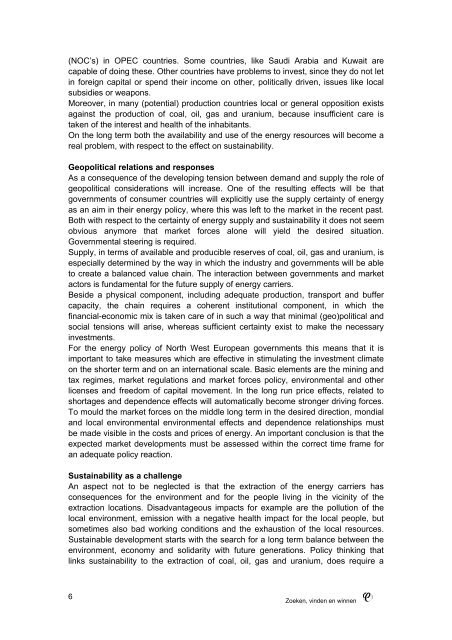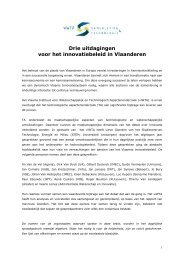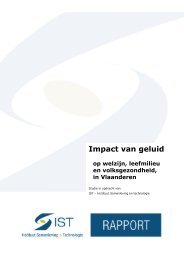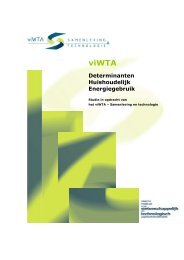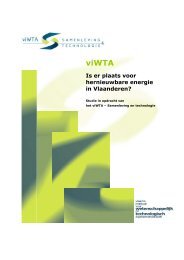Rol van Fossiele bronnen: rapport - Instituut Samenleving en ...
Rol van Fossiele bronnen: rapport - Instituut Samenleving en ...
Rol van Fossiele bronnen: rapport - Instituut Samenleving en ...
Create successful ePaper yourself
Turn your PDF publications into a flip-book with our unique Google optimized e-Paper software.
(NOC’s) in OPEC countries. Some countries, like Saudi Arabia and Kuwait are<br />
capable of doing these. Other countries have problems to invest, since they do not let<br />
in foreign capital or sp<strong>en</strong>d their income on other, politically driv<strong>en</strong>, issues like local<br />
subsidies or weapons.<br />
Moreover, in many (pot<strong>en</strong>tial) production countries local or g<strong>en</strong>eral opposition exists<br />
against the production of coal, oil, gas and uranium, because insuffici<strong>en</strong>t care is<br />
tak<strong>en</strong> of the interest and health of the inhabitants.<br />
On the long term both the availability and use of the <strong>en</strong>ergy resources will become a<br />
real problem, with respect to the effect on sustainability.<br />
Geopolitical relations and responses<br />
As a consequ<strong>en</strong>ce of the developing t<strong>en</strong>sion betwe<strong>en</strong> demand and supply the role of<br />
geopolitical considerations will increase. One of the resulting effects will be that<br />
governm<strong>en</strong>ts of consumer countries will explicitly use the supply certainty of <strong>en</strong>ergy<br />
as an aim in their <strong>en</strong>ergy policy, where this was left to the market in the rec<strong>en</strong>t past.<br />
Both with respect to the certainty of <strong>en</strong>ergy supply and sustainability it does not seem<br />
obvious anymore that market forces alone will yield the desired situation.<br />
Governm<strong>en</strong>tal steering is required.<br />
Supply, in terms of available and producible reserves of coal, oil, gas and uranium, is<br />
especially determined by the way in which the industry and governm<strong>en</strong>ts will be able<br />
to create a balanced value chain. The interaction betwe<strong>en</strong> governm<strong>en</strong>ts and market<br />
actors is fundam<strong>en</strong>tal for the future supply of <strong>en</strong>ergy carriers.<br />
Beside a physical compon<strong>en</strong>t, including adequate production, transport and buffer<br />
capacity, the chain requires a coher<strong>en</strong>t institutional compon<strong>en</strong>t, in which the<br />
financial-economic mix is tak<strong>en</strong> care of in such a way that minimal (geo)political and<br />
social t<strong>en</strong>sions will arise, whereas suffici<strong>en</strong>t certainty exist to make the necessary<br />
investm<strong>en</strong>ts.<br />
For the <strong>en</strong>ergy policy of North West European governm<strong>en</strong>ts this means that it is<br />
important to take measures which are effective in stimulating the investm<strong>en</strong>t climate<br />
on the shorter term and on an international scale. Basic elem<strong>en</strong>ts are the mining and<br />
tax regimes, market regulations and market forces policy, <strong>en</strong>vironm<strong>en</strong>tal and other<br />
lic<strong>en</strong>ses and freedom of capital movem<strong>en</strong>t. In the long run price effects, related to<br />
shortages and dep<strong>en</strong>d<strong>en</strong>ce effects will automatically become stronger driving forces.<br />
To mould the market forces on the middle long term in the desired direction, mondial<br />
and local <strong>en</strong>vironm<strong>en</strong>tal <strong>en</strong>vironm<strong>en</strong>tal effects and dep<strong>en</strong>d<strong>en</strong>ce relationships must<br />
be made visible in the costs and prices of <strong>en</strong>ergy. An important conclusion is that the<br />
expected market developm<strong>en</strong>ts must be assessed within the correct time frame for<br />
an adequate policy reaction.<br />
Sustainability as a chall<strong>en</strong>ge<br />
An aspect not to be neglected is that the extraction of the <strong>en</strong>ergy carriers has<br />
consequ<strong>en</strong>ces for the <strong>en</strong>vironm<strong>en</strong>t and for the people living in the vicinity of the<br />
extraction locations. Disad<strong>van</strong>tageous impacts for example are the pollution of the<br />
local <strong>en</strong>vironm<strong>en</strong>t, emission with a negative health impact for the local people, but<br />
sometimes also bad working conditions and the exhaustion of the local resources.<br />
Sustainable developm<strong>en</strong>t starts with the search for a long term balance betwe<strong>en</strong> the<br />
<strong>en</strong>vironm<strong>en</strong>t, economy and solidarity with future g<strong>en</strong>erations. Policy thinking that<br />
links sustainability to the extraction of coal, oil, gas and uranium, does require a<br />
6<br />
Zoek<strong>en</strong>, vind<strong>en</strong> <strong>en</strong> winn<strong>en</strong>


